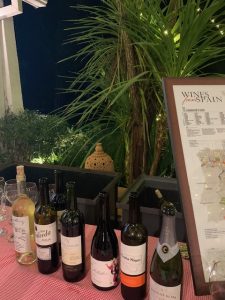

‘Spanish is a loving tongue, soft as music, light as spray’, goes the love song written in 1907 by the cowboy poet, Charles Badger Clark. Later, the poem was set to music, and recorded in 1973 by Bob Dylan, a song that has got me thinking about all things Spanish, such as Don Quixote, the world’s first modern novel, Spanish cuisine, and Spanish wine, with its history dating back to 1000 BC.

Invited guests discuss aromas and flavours of La Vicalanda, a Rioja from northern Spain.
There is a growing number of wine lovers in Zimbabwe, but although Spain is the second largest producer of wine in the world, Spanish wines are few and far between on the shelves of local supermarkets and wineries. It’s possible to view collections from over eighty South African estates, and sample iconic wines from Italy, France, Portugal, Argentina, Chile and New Zealand, but searching for a bottle of Rioja to pair with your Sunday roast, or a carafe of Pedro Ximenez to enjoy with Christmas pudding, is like looking for a needle in a haystack. All this could be about to change, after an exceptional Spanish wine tasting evening at the residence of the Embassy of Spain, that coincided with Black Friday last week.

A selection of Spanish wines.
On arrival, smiling embassy staff welcomed us with a tall flute glass of cava, Spain’s most popular sparkling wine. There are many different styles of cava, but we were offered the elegant Non Plus Ultra Codorniu Brut Gran Reserva, fermented in bottles and then
aged for thirty months in a dark labyrinth of caves in Catalonia, in northern Spain. The fine bubbles, and aromas of the Catalan wild flowers and grasses of this stylish sparkling wine, went some way in dispelling the dismay we all felt on the day we were hit with a new virus variant and travel bans were introduced, putting plans for Christmas in disarray. Tapas of Spanish tortilla and green olives were served as guests continued to arrive.
As H.E. Mr Santiago Gomez-Acebo stood up to welcome us all, a flurry of ishwas (flying ants) swooped briefly overhead. Considered by many to be a tasty snack, second in popularity to the mopane worm, ishwas were not on the menu tonight. Undeterred, our host continued, expressing his excitement at the impact he feels Spanish wines are likely to have on the Zimbabwean market.
Wine guru Stan Higgins then took the floor to introduce vinos espanoles, a new kid on the block for the majority of Zimbabweans, calling the excited and already unruly group of guests to order. An array of gleaming wine glasses were at the ready, and we would taste a selection of seven delectable Spanish wines, both red and white.
First off, Cuatro Rayas – Blanco de Rueda, Verdejo, was fresh, fruity and slightly dry – the perfect tipple to sip and enjoy with friends on a warm summer evening. I could happily have drained my glass, but hoping to retain my critical faculties throughout the tasting, reluctantly emptied the dregs into the allotted bucket, and rinsed the glass out with fresh water, ready for the next offering.

His Excellency Mr Santiago Gomez-Acebo at a Spanish wine tasting evening.
A superb platter of snacks made by Leigh Vermaak of the Gourmet Girls catering company, was created to pair with each wine. A canapé of smoked salmon and asparagus tips was the perfect foil for the crisp Blanco de Rueda.
Santiago Ruiz, a many-layered white wine with a slight mineral taste, was paired with a mouth-watering canapé of goats cheese and artichoke hearts.
Red wines followed and the level of noise increased, bringing to mind images of Dionysus, god of the grape-harvest, his hair full of vine leaves, holding up a wine goblet. Later, Stan Higgins invited guests to vote for the most impressive wine of the evening. There was an overwhelming consensus for La Vicalanda – Tinto Reserva from la Rioja in northern Spain. This purple-hued wine was velvety, complex and full bodied, and a worthy overall winner. I would have voted for La Vicalanda had I not fallen for the final offering, the sweet and lovely 1927 Pedro Ximenez, a dark-hued, rich and intoxicating dessert wine, with flavours of fig jam, molasses and espresso.
Zimbabweans are clearly intrigued by Spanish wines, and it’s a matter of time before local wineries start importing a wider selection of vinos espanoles. There may still be time to find a bottle of Rioja to pair with your Christmas turkey, or a Cava, with which to usher in the New Year.